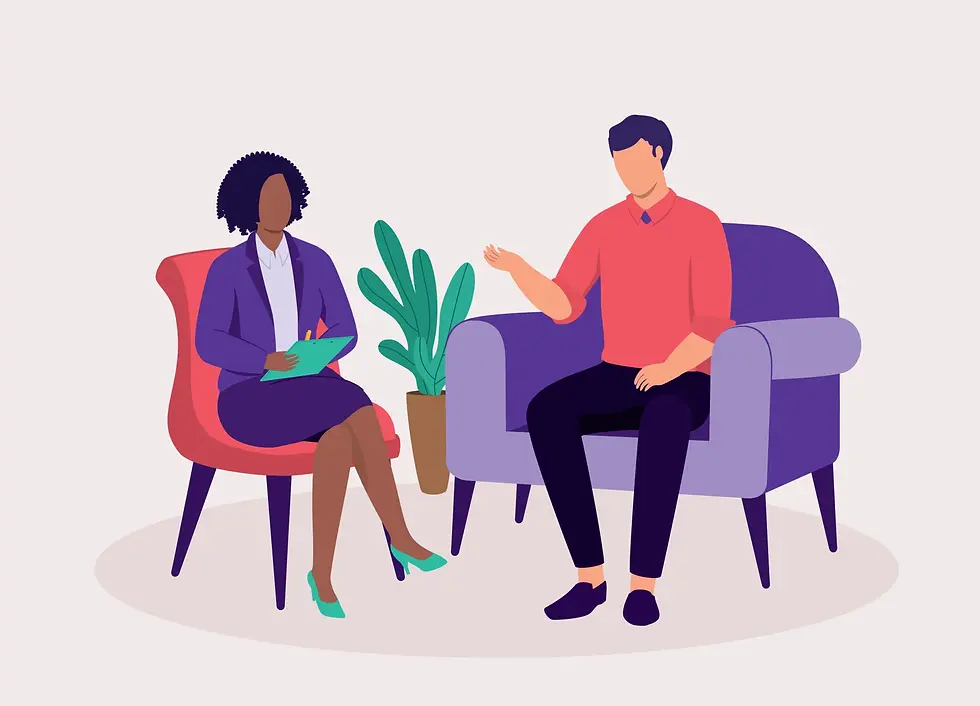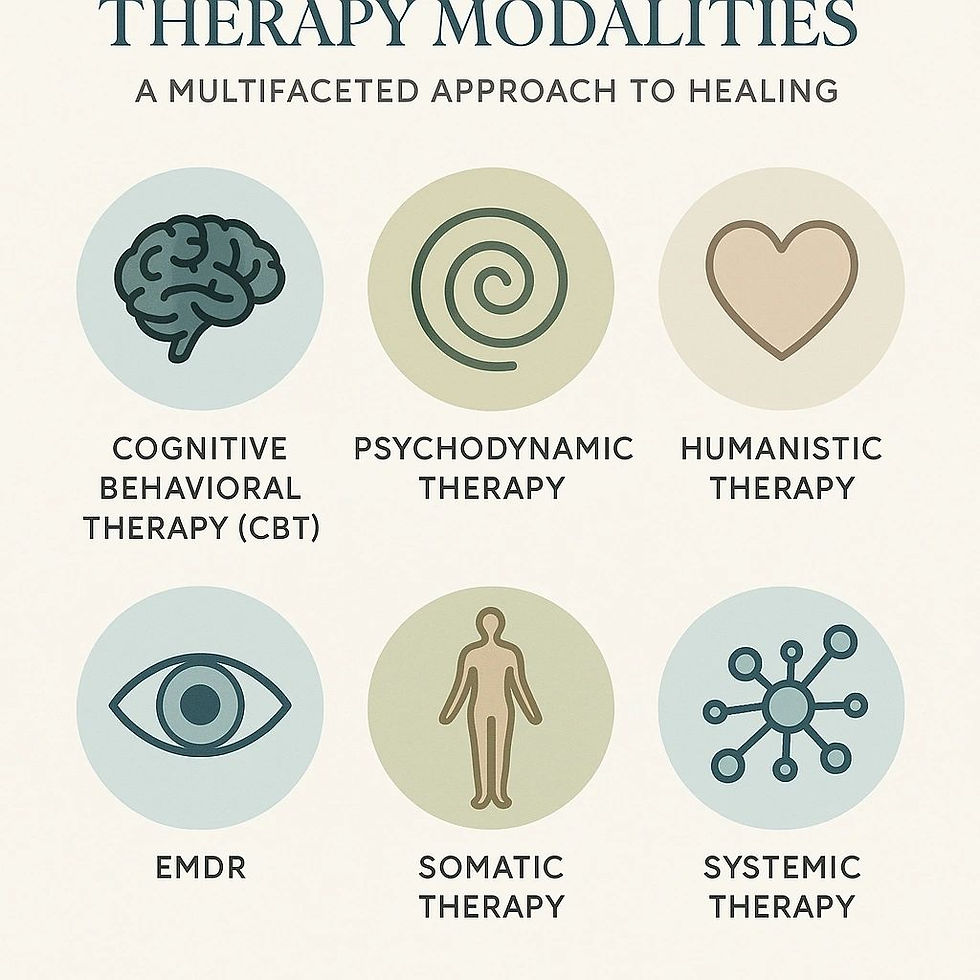Trauma & Healing: The Impact of Discrimination on Mental Health
- michelleluna
- Jun 16
- 4 min read

Discrimination isn’t just unfair — it’s traumatic. For LGBTQ+ individuals, the pain of being marginalized, judged, or rejected for simply existing can leave lasting emotional scars. These experiences don’t always come with visible wounds, but they often live in the body and mind, affecting how we move through the world, how we see ourselves, and how safe we feel in our communities.
Discrimination — whether it’s blatant hate or subtle microaggressions — is a form of trauma. And like any trauma, it can profoundly affect mental health. Understanding this connection is the first step toward healing. In this blog, we’ll explore how discrimination impacts mental well-being, how trauma can manifest, and what healing can look like for LGBTQ+ individuals navigating these challenges.
Discrimination as Trauma
Trauma is any experience that overwhelms our ability to cope and makes us feel unsafe, powerless, or deeply threatened. For LGBTQ+ people, that trauma can come from:
Bullying or harassment at school or work
Verbal, emotional, or physical abuse
Being rejected by family or friends after coming out
Experiencing religious or cultural condemnation
Systemic discrimination in housing, healthcare, or employment
Violence based on sexual orientation, gender identity, or expression
Even repeated exposure to seemingly “small” acts — like being misgendered, stereotyped, or excluded — can add up and lead to what psychologists call complex trauma or cumulative trauma. When you’re constantly navigating a world where your identity is seen as “less than” or “other,” your nervous system is always on alert, leading to chronic stress, anxiety, and emotional exhaustion.
How Discrimination Impacts Mental Health
The emotional and psychological effects of discrimination are real and well-documented. Here are a few common ways it can show up:
1. Hypervigilance and Anxiety
Constantly anticipating rejection, judgment, or danger can leave LGBTQ+ individuals in a state of high alert. This hypervigilance can cause chronic anxiety, panic attacks, sleep issues, and trouble concentrating.
2. Depression and Hopelessness
When you’re told—directly or indirectly—that who you are is unacceptable or “wrong,” it’s easy to internalize that message. Many LGBTQ+ people struggle with deep feelings of sadness, hopelessness, or numbness, especially if they lack affirming relationships.
3. Low Self-Worth
Discrimination chips away at your sense of self. When your identity is constantly invalidated, you may start to believe you don’t deserve love, safety, or happiness. This can lead to low self-esteem and difficulties setting boundaries or advocating for yourself.
4. Isolation and Loneliness
Fear of judgment or harm can lead LGBTQ+ individuals to withdraw from social spaces, avoid new relationships, or hide parts of themselves. This isolation makes it harder to find support and reinforces feelings of loneliness.
5. Trauma Responses (PTSD or Complex PTSD)
For those who have experienced severe or repeated trauma, symptoms can resemble post-traumatic stress disorder (PTSD) — flashbacks, avoidance, emotional dysregulation, or dissociation. These aren’t just “emotional issues” — they’re natural responses to traumatic experiences.
Healing is Possible
The pain caused by discrimination is valid, but it doesn’t have to define your story. Healing from trauma, especially trauma rooted in identity-based discrimination, is a journey — and it’s one that you deserve to take with support, care, and compassion.
Here are some steps that can help along the way:
1. Find LGBTQ+ Affirming Mental Health Support
Working with a therapist who understands and affirms your identity can be incredibly healing. Therapy can help you process trauma, rebuild self-worth, and learn coping strategies in a safe environment. Look for counselors with experience in LGBTQ+ issues and trauma-informed care.
Resources like:
Inclusive Therapists
Therapy Den
The Trevor Project
National Queer and Trans Therapists of Color Network (NQTTCN)
…can help you find affirming professionals near you or virtually.
2. Connect with Community
Healing happens in connection. Whether it’s a local LGBTQ+ group, an online forum, or a chosen family of queer friends, being surrounded by people who see and celebrate you can be life-changing. Shared experiences and mutual support are powerful antidotes to isolation and shame.
3. Practice Somatic Healing
Trauma often lives in the body. Somatic therapies (like breathwork, yoga, EMDR, or movement practices) help release trauma stored in the nervous system. You don’t have to talk your way through healing — sometimes your body needs to lead the way.
4. Set Boundaries with Harmful People or Spaces
You don’t owe access to anyone who undermines your worth. Setting boundaries is a form of self-protection and self-love. This might mean limiting contact with unsupportive family members, stepping away from toxic online spaces, or leaving environments where you’re not safe.
5. Reclaim Joy and Identity
Healing also means reclaiming your joy, creativity, and sense of self. Explore parts of your identity that feel affirming. Wear what feels right. Celebrate your queer and trans joy. Let yourself take up space without apology.
6. Educate Yourself, But Don’t Carry the Burden Alone
Understanding how discrimination affects mental health can be empowering. But remember — it’s not your job to educate everyone or dismantle the entire system by yourself. Lean into community care, shared activism, and support systems when the weight feels heavy.
Final Thoughts: You Are Not Alone
The trauma of discrimination is real, but so is the possibility of healing. You didn’t choose to be hurt — but you can choose healing, connection, and joy. Your identity is not a burden; it’s a source of strength. Every step you take toward healing — no matter how small — is an act of resistance and self-love.
You are worthy of support. You are worthy of peace. And most of all, you are not alone.








Comments